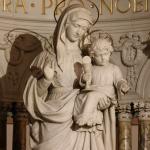
Tradition is important, but we must understand tradition is meant to be a living tradition, one which leaves us open to the prompting of the Spirit. Tradition is not meant to be treated as a dead letter where the expression of the faith is said to be unchangeable. We are not expected to live exactly like those who lived before us; our situation, our social context is different from theirs. The faith is more than following a list of propositions and an unchangeable code of conduct. Discipline changes over time, and if we want to live in and experience the vitality of the Spirit, we will do well to keep this in mind. We don’t want to get stuck with a dead legalism, because such legalism leads nowhere, which is why St. Paul said:
Such is the confidence that we have through Christ toward God. Not that we are competent of ourselves to claim anything as coming from us; our competence is from God, who has made us competent to be ministers of a new covenant, not in a written code but in the Spirit; for the written code kills, but the Spirit gives life (2 Cor. 3:4-6 RSV).
Paul and the other apostles wanted us to have a living faith, one which could be and would be flexible. Discipline is meant for the sake of the people, to help direct them, and that means, it must be done prudentially, realizing people coming from different times and places will have different needs. People often will find that once they have followed a particular discipline, they will have gained all they could and should have gained from it, making it unnecessary or even a hindrance if they try to continue with it beyond its intended use. This is not to say such disciplines were bad or unfruitful, but rather, engaging them when they are no longer necessary can hold us back, indeed, if we become too attached to them, we can find ourselves no longer going forward but backward in our theosis (spiritual development). Everything should be done for a purpose, and that purpose, not the tool for that purpose, is what is important; when a particular tool is no longer useful, it is time to put it aside. This is why liturgy develops and change. Those who would try to artificially halt such development are actually stifling the Spirit. Nonetheless, they can’t do so forever; the Spirit will blow as it wills, and eventually it will bring in that new spiritual life, that vitality, which is needed. While, after a long period of stifling legalism, what the Spirit brings might appear radically new, if one looked and examined closely to what it brings, its continuity with the past can be found. Sadly, many people will resist the Spirit and seek to stay in place, or worse, turn backward, following the example of Lot’s wife; they will give all kinds of justifications for their obstinacy, but in the end, like Lot’s wife, their rigidity will be their downfall as they find themselves left behind.
Abba Agathon understood this—the journey is what is important, and if we confuse a part of the journey with the destination itself, if we confuse a tool which we use as the ends which we seek, we will not thrive in the Spirit. Thus, we can read how he directed his disciples to help build up a monastic cell; once it was complete, he saw it was time to move on, which led some of his disciples to question what it was they were doing:
It was said of Abba Agathon that he spent a long time building a cell with his disciples. At last, when it was finished, they came to live there. Seeing something during the first week which seems to him harmful, he said to his disciples, ‘Get up, let us leave this place.’ But they were dismayed and replied, ‘If you had already decided to move, why have we taken so much trouble building the cell? People will be scandalized at us, and will say, “Look at them, moving again; what unstable people!”’ He saw they were held back by timidity and said to them, ‘If some are scandalized, others, on the contrary, will be much edified and will say, “How blessed are they who go away for God’s sake, having no other care.” However, let him who wants to come, come; as for me, I am going.’ Then they prostrated themselves to the ground and besought him to allow them to go with him. [1]
We should accept change, accept that the prompting of the Spirit which lies behind such change, so that even if things are different in the future than they are now, they will be different because people will have different needs, even as we find things are different today as they were in the past because those in the past had needs which differed from those we have today. To try to ignore the Spirit, to cut it off by legalism, is to lead to a dead end with a dead faith. This, of course, has been understood by the church throughout its existence. Its leaders, working with the Spirit, have often found themselves having to deal with legalists who strangled the Spirit. Those who attack them today due their misunderstanding of the faith, due to their legalism, follow the example of rigorists in the past, such as the Novatians who did not want to offer mercy to the lapsed, or the Bohemians who did not like medieval changes to the liturgy. What Nicholas of Cusa explained in his writings to the Bohemians are as valid today as they were when they were used against the arguments of the Bohemians: “Hence, even if today there is an interpretation by the Church of the same Gospel command differing from that of former times, nevertheless, the understanding now currently in use for the rule of the Church was inspired as befitting the times and should be accepted as the way of salvation.” [2] Times change. Discipline changes. The church is on a pilgrimage. If we don’t understand this, we risk cutting ourselves off from the Spirit and the life which the Spirit wants to bring us.
.
[1] The Sayings of the Desert Fathers. trans. Benedicta Ward (Kalamazoo, MI: Cistercian Publications, 1984), 21 [Saying of Abba Agathon 6].
[2] Nicholas of Cusa, “To the Bohemians” in Nichola of Cusa: Writing on Church and Reform. Trans. Thomas M. Izbicki (Cambridge: Harvard University Press, 2008), 23.
Stay in touch! Like A Little Bit of Nothing on Facebook.
If you liked what you read, please consider sharing it with your friends and family!













